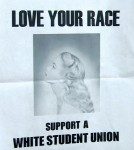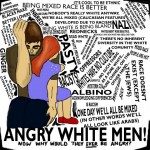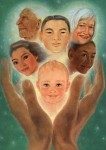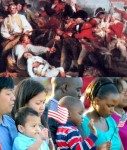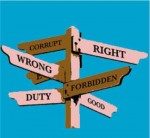
Whites are not simply forbidden to discriminate ourselves from others and exclude them – racial integration is imposed by genocidal anti-White governments under the disingenuous guise of increasing diversity and equality. Demonized and betrayed from above, the White masses vote with their feet. Despite the 24/7 propaganda telling us we should celebrate it, Whites are instead trying to escape the dystopia non-Whites bring.
Where Mexicans go, there is Mexico. Where Africans go, there is Africa. Likewise, where Whites go, there is Whitopia.
EEOC Home Page. What You Should Know about the EEOC and Religious and National Origin Discrimination Involving the Muslim, Sikh, Arab, Middle Eastern and South Asian Communities.
Age of Treason: The Unspeakable Blackness of Section 8 and Crime:
On the merged map, dense violent-crime areas are shaded dark blue, and Section8 addresses are represented by little red dots. All of the dark-blue areas are covered in little red dots, like bursts of gunfire. The rest of the city has almost no dots.
Betts’s office is filled with books about knocking down the projects, an effort considered by fellow housing experts to be their great contribution to the civil-rights movement. The work grew out of a long history of white resistance to blacks’ moving out of what used to be called the ghetto. During much of the 20th century, white people used bombs and mobs to keep black people out of their neighborhoods. In 1949 in Chicago, a rumor that a black family was moving onto a white block prompted a riot that grew to 10,000 people in four days. “Americans had been treating blacks seeking housing outside the ghetto not much better than … [the] cook treated the dog who sought a crust of bread,” wrote the ACLU lawyer and fair-housing advocate Alexander Polikoff in his book Waiting for Gautreaux.
Polikoff is a hero to Betts and many of her colleagues. In August 1966, he filed two related class-action suits against the Chicago Housing Authority and the U.S. Department of Housing and Urban Development, on behalf of a woman named Dorothy Gautreaux and other tenants. Gautreaux wanted to leave the ghetto, but the CHA offered housing only in neighborhoods just like hers. Polikoff became notorious in the Chicago suburbs; one community group, he wrote, awarded him a gold-plated pooper-scooper “to clean up all the shit” he wanted to bring into the neighborhood. A decade later, he argued the case before the Supreme Court and won. Legal scholars today often compare the case’s significance to that of Brown v. Board of Education of Topeka.
PRRAC – Alexander Polikoff’s Gautreaux Proposal:
Some 170 years ago, Alexis de Toqueville [sic] called racial inequality “the most formidable evil threatening the future of the United States.” Toqueville went on to prophesy that the evil of racial inequality would not be resolved — indeed, that it would eventually bring America to disaster.
Ending black ghettos wouldn’t end anti-black attitudes any more than ending Jewish ghettos ended anti-semitism. But it is not easy to find anything in American society that matches the black ghetto for its poisoning effect on attitudes, values and conduct.
Sixty years ago, Gunnar Myrdal wrote: “White prejudice and discrimination keep the Negro low in standards of living, health, education, manners and morals. This, in its turn, gives support to white prejudice.”
Suppose 50,000 housing choice vouchers were made available annually, were earmarked for use by black families living in urban ghettos, and could be used only in non-ghetto locations — say, census tracts with less than 10% poverty and not minority impacted. Suppose that the vouchers were allocated to our 125 largest metropolitan areas. Suppose also that to avoid “threatening” any receiving community, no more than a specified number of families (an arbitrary number — say, ten, or a small fraction of occupied housing units) could move into any city, town or village in a year.
Polikoff and those to whom he is a hero care only to help blacks, no matter the harm done to Whites. Polikoff also misrepresents Tocqueville’s views. Tocqueville saw the racial inequality of black and White as unresolvable. He implied that the evil disaster, to use Polikoff’s terms, would be brought about by declaring blacks equal and setting them free among us.
Alexis de Tocqueville, Wikiquote, Democracy in America, Volume I (1835):
The most formidable of all the ills that threaten the future of the Union arises from the presence of a black population upon its territory; and in contemplating the cause of the present embarrassments, or the future dangers of the United States, the observer is invariably led to this as a primary fact. (Chapter XVIII)
You may set the Negro free, but you cannot make him otherwise than an alien to the European. Nor is this all we scarcely acknowledge the common features of humanity in this stranger whom slavery has brought among us. His physiognomy is to our eyes hideous, his understanding weak, his tastes low; and we are almost inclined to look upon him as a being intermediate between man and the brutes. (Chapter XVIII)
Brown v. Board of Education, Wikipedia:
The plaintiffs in Brown asserted that this system of racial separation, while masquerading as providing separate but equal treatment of both white and black Americans, instead perpetuated inferior accommodations, services, and treatment for black Americans.
Brown was influenced by UNESCO’s 1950 Statement, signed by a wide variety of internationally renowned scholars, titled The Race Question. Another work that the Supreme Court cited was Gunnar Myrdal’s An American Dilemma: The Negro Problem and Modern Democracy (1944). Myrdal had been a signatory of the UNESCO declaration.
United Nations Educational, Scientific and Cultural Organization, UNESCO. The Race Question, Wikipedia:
The Race Question[1] is the first of four UNESCO statements about issues of race. It was issued on 18 July 1950 following World War II and Nazi racism. The statement was an attempt to clarify what was scientifically known about race and a moral condemnation of racism.
Half of the authors are jews, including notorious jews Claude Lévi-Strauss, one of the founders of ethnology and leading theorist of cultural relativism, and anthropologist Ashley Montagu.
The constitution itself stated that “The great and terrible war that has now ended was a war made possible by the denial of the democratic principles of the dignity, equality and mutual respect of men, and by the propagation, in their place, through ignorance and prejudice, of the doctrine of the inequality of men and races.”
Massive resistance, Wikipedia:
Massive resistance was a policy declared by U.S. Senator Harry F. Byrd, Sr. of Virginia on February 24, 1956, to unite other white politicians and leaders in Virginia in a campaign of new state laws and policies to prevent public school desegregation after the Brown v. Board of Education Supreme Court decision in 1954.[1] Although most of the laws created to implement Massive Resistance were negated by state and federal courts by January 1960, some policies and effects of the campaign against integrated public schools continued in Virginia for many more years; many schools, and even an entire school system, were shut down in preference to integration.
GUIDANCE ON THE VOLUNTARY USE OF RACE TO ACHIEVE DIVERSITY AND AVOID RACIAL ISOLATION IN ELEMENTARY AND SECONDARY SCHOOLS, U.S. Department of Justice – Civil Rights Division, U.S. Department of Education – Office for Civil Rights:
Conversely, where schools lack a diverse student body or are racially isolated (i.e., are composed overwhelmingly of students of one race), they may fail to provide the full panoply of benefits that K-12 schools can offer. The academic achievement of students at racially isolated schools often lags behind that of their peers at more diverse schools. Racially isolated schools often have fewer effective teachers, higher teacher turnover rates, less rigorous curricular resources (e.g., college preparatory courses), and inferior facilities and other educational resources. Reducing racial isolation in schools is also important because students who are not exposed to racial diversity in school often lack other opportunities to interact with students from different racial backgrounds.5
For all these reasons, the Departments recognize, as has a majority of Justices on the Supreme Court, the compelling interests that K-12 schools have in obtaining the benefits that flow from achieving a diverse student body and avoiding racial isolation.6 This guidance addresses the degree of flexibility that school districts have to take proactive steps, in a manner consistent with principles articulated in Supreme Court opinions, to meet these compelling interests.
White flight, Wikipedia:
White flight is a term that originated in the United States, starting in the mid-20th century, and applied to the large-scale migration of whites of various European ancestries from racially mixed urban regions to more racially homogeneous suburban or exurban regions. It was first seen as originating from fear and anxiety about increasing minority populations.
However, some historians have challenged the phrase “white flight” as a misnomer whose use should be reconsidered. In her study of Chicago’s West Side during the post-war era, historian Amanda Seligman argues that the phrase misleadingly suggests that whites immediately departed when blacks moved into the neighborhood, when in fact, many whites defended their space with violence, intimidation, or legal tactics.
America’s Booming White Enclaves, TIME, 12 Oct 2009:
Traveling some 27,000 miles, African-American journalist Rich Benjamin roamed the United States from 2007 to 2009 exploring a major demographic shift that’s attracting remarkably little attention — the flight of white residents from cities and integrated suburbs into cloistered, racially homogeneous enclaves. Tidy communities such as St. George, Utah and Coeur d’Alene, Idaho — places Benjamin calls Whitopias — have grown at triple the rate of America’s cities in recent years, raising troubling questions about the country’s multiracial cohesion. The Stanford literature Ph.D. chronicled his adventure in a new book, Searching for Whitopia: An Improbable Journey to the Heart of White America, and spoke with TIME about what he found.
Let’s start with the title of your book — what is a Whitopia, exactly? It seems to be more than just a place where a lot of white people live.
Absolutely. A Whitopia has three things. First, it has posted more than 6% population growth since 2000. The second thing is that the majority of that growth — upwards of 90% — comes from white migrants. The third thing a Whitopia has is an ineffable social charm — a pleasant look and feel.
(Read “A Brief History of the NAACP.”)
You say that many Whitopias offer a high quality of life and tend to perform well on those “Best Places to Live” lists that run in magazines. Do you think people are also drawn to these places specifically for their whiteness?
The major draw to Whitopia is that they’re safe communities with good public schools and beautiful natural resources. Those qualities are subconsciously inseparable from race in many Americans’ minds. For some people, race is a major role, and they said so to my face, but most of the Whitopians I encountered aren’t intentionally practicing racial discrimination or self-segregation.
What is the danger Whitopias pose to America as a whole?
You can call me old-fashioned, but I’m an integrationist. A democracy can’t function at its optimum unless all members are integrated as full members.
A community full of like-minded people tends to enforce their own view of the world and closes off opposing viewpoints. You can go to parties in New York City where the liberal smugness is intolerable, because they’re only hearing liberal viewpoints. On the Whitopian conservative side, it’s spinning out of control. Look at the tea-bagger movement, where people are concerned their taxes are going to be wasted on minorities and illegal immigrants. Same with the movement that says Obama is not a citizen.
You, a black man, sat in on a white separatist retreat. How did that go over?
They were curious and shocked they had found a black man on their premises. A lot of the members of the church took pains to explain to me the difference between white supremacy and white separatism. They said, “We don’t think we’re better than you, we just want to be separate from you.”
We see that tendency to divide ourselves into identity groups in places all over the world, it seems, whether it’s by race or religion or political view. Is it simply human nature, do you think?
I just reject that argument. People in Whitopia would say, “Hey Rich, birds of a feather flock together. What’s the big deal?” Our government and businesses across the country make decisions every day that perpetuate segregation. When you say homes need to be built on a one-acre lot, when you say apartment renters can’t live in your community — these concrete policies are what contribute to segregation. It’s not in our biology, and it’s not natural.
Benjamin repeats the same Big Lie put forth in The Race Question. Race is real. It’s in our biology. The urge to be around people like ourselves is perfectly natural and normal. In fact Whites act on those urges despite hostile attempts to compel us to behave otherwise. Non-Whites don’t want us to discriminate ourselves from them or exclude them because they don’t think it’s good for them. We should just reject their arguments and do what we need to do because it is best for us.
The podcast will be broadcast and available for download on Tuesday at 9PM ET.
Podcast: Play in new window | Download












